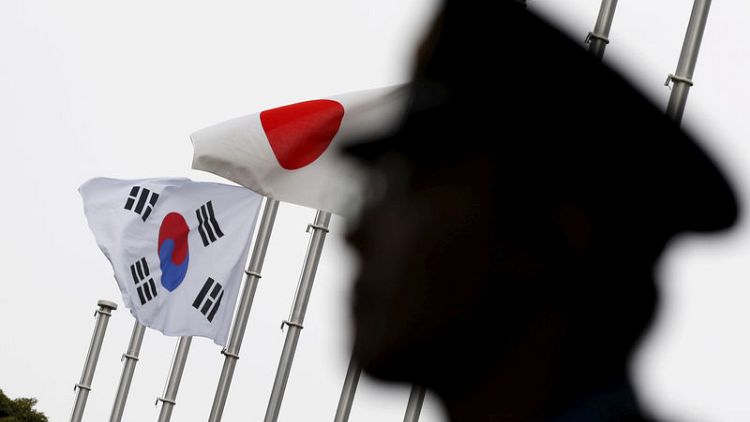By Hyonhee Shin and Tim Kelly
SEOUL/TOKYO (Reuters) - South Korea's decision to scrap an intelligence-sharing pact with Japan could harm efforts to understand threats from North Korea, and potentially weaken the ability to monitor its missile launches, officials and analysts say.
South Korea's announcement on Thursday that it would abandon the accord drew a swift protest from Tokyo and ratcheted up the neighbours' feud over history and trade. The agreement had been due for automatic renewal on Saturday.
Seoul's decision not to renew the General Security of Military Information Agreement (GSOMIA) will complicate joint efforts to detect and assess North Korea's missile programme as both must now rely on sharing information through the United States, their common ally.
Much of the intelligence shared pertained to longer-term threats or post-event analysis of North Korea's missile launches, and officials emphasised that real-time missile defences do not rely on the arrangement.
But analysts say scrapping the pact could cause more acute problems if a crisis breaks out and the two countries lack a foundation of swift sharing of information.
The pact was significant as a cornerstone of three-way cooperation with the United States, said Yang Uk, a senior research fellow at the Korea Defence and Security Forum in Seoul.
"When it comes to North Korea, it's like three blind men touching an elephant to see what it's like," Yang said.
"Sharing intelligence is meant to paint a big picture using various assets and channels, but now one of the men is out."
UNDERSTANDING NORTH KOREA
Less cooperation between South Korea and Japan could lead to less detailed analysis of intelligence on North Korea, say analysts.
For example, Japan has sometimes provided information on long-range missile tests by North Korea that landed far from South Korea.
Japan in turn will be denied access to Seoul's intelligence on North Korea gathered through human networks such as defectors and agents around the world, a South Korean military official told Reuters.
"For Japan, it's very painful to lose North Korea-related information gained through human intelligence," said retired Japanese admiral Yoji Koda.
There have been 29 instances of information traded between South Korea and Japan since they signed the pact in 2016, says Kim Jong-dae, a South Korean lawmaker who got data from the military.
And almost all of this year's eight exchanges happened after North Korea began testing a new type of short-range missile in late July.
"Short-range missiles are relatively easier to detect for both sides, but Japan could have better knowledge if North Korea fires mid- and long-range missiles which are out of our radars, though we work with the United States," the South Korean military official said.
The GSOMIA pact helped in making joint longer-term assessments of North Korea's threats as each side would provide information upon request, unlike South Korea and the United States that share data almost in real-time, officials said.
But going through an intermediary is a step backward that could make future cooperation in real-time tracking even less likely.
"Now you don't know when the sought-after information will be passed - it could take hours, or a day," added the official, who declined to be identified due to the sensitivity of the matter.
IMPACT ON U.S. ALLIANCE
The United States, Japan, and South Korea signed a separate deal, the Trilateral Information Sharing Arrangement (TISA) in 2014, in the face of North Korea's growing nuclear and missile threats.
That limited the scope of shareable information to Pyongyang's nuclear and missile programmes, in contrast to which GSOMIA allowed South Korea and Japan to ask each other for broader intelligence on North Korea.
South Korea will "actively" utilise TISA to ensure there is no information vacuum, Deputy National Security Adviser Kim Hyun-chong said on Friday.
An official of Japan's Self Defence Forces said that though "a lot of people were surprised" by Seoul's decision to scrap the pact, cooperation would continue at other levels.
U.S. Secretary of State Mike Pompeo said Washington was "disappointed," an unusually strong word that has not been used in years, while the Pentagon expressed "strong concern".
Kim, the South Korean official, said it was natural for the United States to be disappointed because it had hoped GSOMIA would be rolled over.
But he dismissed South Korean media reports that Seoul did not give prior notice, saying at least nine telephone calls had been made between the two sides between July and August.
The flare-up in the history and trade dispute between its two biggest Asian allies has worried the United States, which fears weakened security cooperation as China and Russia grow more assertive, and the North Korean threat is unabated.
TISA was a U.S.-led initiative launched after a 2012 attempt to seal a two-way pact fell apart amid opposition in South Korea to military cooperation with Japan. Seoul eventually signed the GSOMIA pact in 2016, as the United States stepped up pressure.
The United States has urged both sides to reach a "standstill agreement" to buy time for talks before Japan strips South Korea of its status of favoured trading partner.
"It is a decision from which South Korea has a lot more to lose than to gain," said Shin Beom-chul, a senior fellow at the Asan Institute for Policy Studies in Seoul.
"There could be greater pressure from the United States, such as to pay more defence costs and support its security initiative in the Middle East."
(Reporting by Hyonhee Shin in SEOUL and Tim Kelly in TOKYO; Additional reporting by Joyce Lee in SEOUL and Kiyoshi Takenaka in JAPAN; Editing by Josh Smith and Clarence Fernandez)
